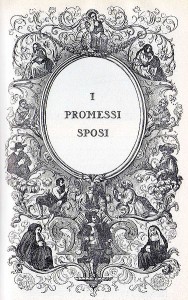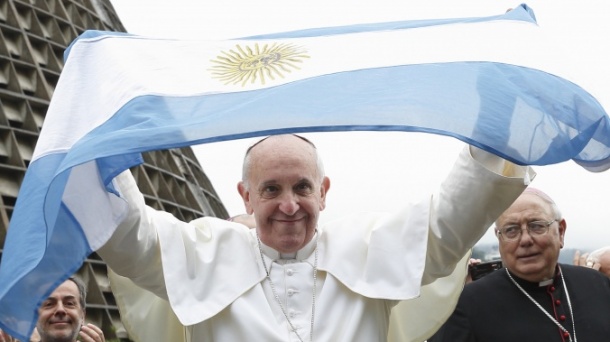Fr. Antonio Spadaro’s interview of Pope Francis, published this week in Jesuit publications around the world, set people of all religious stripes talking. However, it soon became clear who read the interview carefully, in it’s entirety, and who focused on the headline worthy bits. How did it become clear?
Throughout the interview Pope Francis used phrases that didn’t quite seem to make sense in English, or made cultural references that went over the heads of English speakers. The few, astute readers started asking questions about these phrases via Twitter and other social media. Pope Francis is an Argetine-Italian, and has a full arsenal of witty one liners that come with such a cultural background.
Lost in Translation
We first heard this phrase uttered by the pope during the return flight to Rome after World Youth Day in Rio. Asked about the Vatican bank, he mentioned the recent arrest of Monsignor Nunzio Scarano on charges of fraud. Pope Francis said, “he’s not in jail because he resembles Blessed Imelda.” The media took this to mean “he’s no saint.” The phrase came up again in the famous interview with Fr. Spadaro. Pope Francis says, “To be sure I have never been like the Blessed Imelda, but I’ve never been a right winger.”
America magazine added the phrase “goody-goody” in brackets to explain what the pope means with his reference to this little-known blessed. Father Horacio Ortiz, a priest for the Archdiocese of Buenos Aires, says while Cardinal Bergoglio had been known to use this phrase, the expression is actually rather common in clerical circles in Buenos Aires and beyond.
Blessed Imelda
Blessed Imelda was born in Bologna, Italy, the daughter of the Count and Countess Lambertini. As a child her “celestial inclinations” were noticeable at an early age. According to one biography, when she cried the only thing that could soothe her was hearing the names of Jesus and Mary pronounced. She was often found on knees in prayer, hands lifted up, eyes misty from tears of love, oblivious to what was going on around her. Tradition states she cared for the altar in the family chapel and would often slip out of family parties to sit before the Blessed Sacrament.

At the age of nine she entered a cloistered convent, despite her parents’ attempts to convince her otherwise. Although she was accepted into the novitiate, she was still considered too young to receive communion. Instead, she burned with love for Christ and the longing to receive him in the Eucharist. It is said that he love for Christ was so strong, she believed she would die of love for him.
One day when Imelda was 11 years old a mystical event took place. The sisters had just finished celebrating Mass and all, except Imelda, had received Communion. As the sisters were filing out of the chapel, she prostrated herself on the floor and remained there for some time. The chapel was filled with a sweet scent that wafted through the convent and drew the sisters back to the chapel. There, they saw the chapel fill with a bright light, and a Host floated in the air. The chaplain immediately understood it was God’s will that Imelda receive the Eucharist. He vested, plucked the floating Host from the air, and gave Imelda her First Communion. Imelda’s face immediately changed. It took a few moments, but the sisters realized Imelda has just died, out of sheer love for Christ.
For some, this type of sanctity can seem almost over the top and certainly unattainable. With his phrase, “I’ve never been like the Blessed Imelda” is saying, essentially, ‘there is nothing special about me, I strive for holiness in my everyday life, like everyone else.’ He is not locked way in a cloister, spending hour upon hour in the type of contemplation that leads one to live in complete detachment from the world.
Literary References
The wide ranging interview by Fr. Spadaro also covered the pope’s personal tastes: music, books, film. Francis may be the first pope to publicly state his affinity for the films of Federico Fellini. He tells Fr. Spadaro, “La Strada (The Street) by Fellini, is the movie that perhaps I loved the most.”
As a former professor of literature the pope also has a list of favourite novels and his own ideas as to how literature should be taught. He tells Fr. Spadaro, “I have read
The Betrothed by Alessandro Manzoni, three times, and I have it now on my table because I want to read it again.”

Manzoni was an Italian exponent of the Romantic literary movement. His novel I Promessi Sposi (The Betrothed) was published around 1825. The novel follows the trials and tribulations of Renzo and Lucia, two young, innocent lovers, eager to marry. Their plans for marriage are thwarted by a wealthy, powerful, nobleman who essentially runs the town. He wants to marry Lucia and threatens the town priest with terrible consequences if he performs the ceremony for the young couple. Both Renzo and Lucia have no choice but to flee their village. In following their separate adventures, the novel exposes the many vices that plagued society and church hierarchy at that time. I Promessi Sposi is required reading in Italian classrooms.
Interestingly enough every Italian I’ve met who was schooled in Italy, groans at the mention of the book, while foreign-raised Italians (like Pope Francis) can’t seem to get enough of the classic. The book is not easy to find in translation. It does, however, explain the complicated Italian relationship with the Church hierarchy.
Throughout the novel the young lovers come across various priests and religious. Some are the embodiment of Christian Charity and holiness, while others are clearly servants of man rather than servants of God. The character referred to as “the Unnamed One” is painted as a self-serving, careerist prelate. He is contrasted with the figure of Cardinal Federico Borromeo, who is shown as a holy, wise, pastor with the best interests of his flock at heart. So holy and wise is Borromeo, he affects the conversion of one of the chief villains in the novel.
Nuances
None of these things are indispensable for understanding what Pope Francis means when he says something in public. What these references show, is that he is a man in touch with the world even if he considers himself a little “naïve.” Understanding the cultural references and phrases the Italo-Argentine pope pulls out of his hat can only help understand the nuances of what he says. Just wait until the day he says we should stop "removing leather" from other people !
---
(CNS Photo/Paul Haring)


